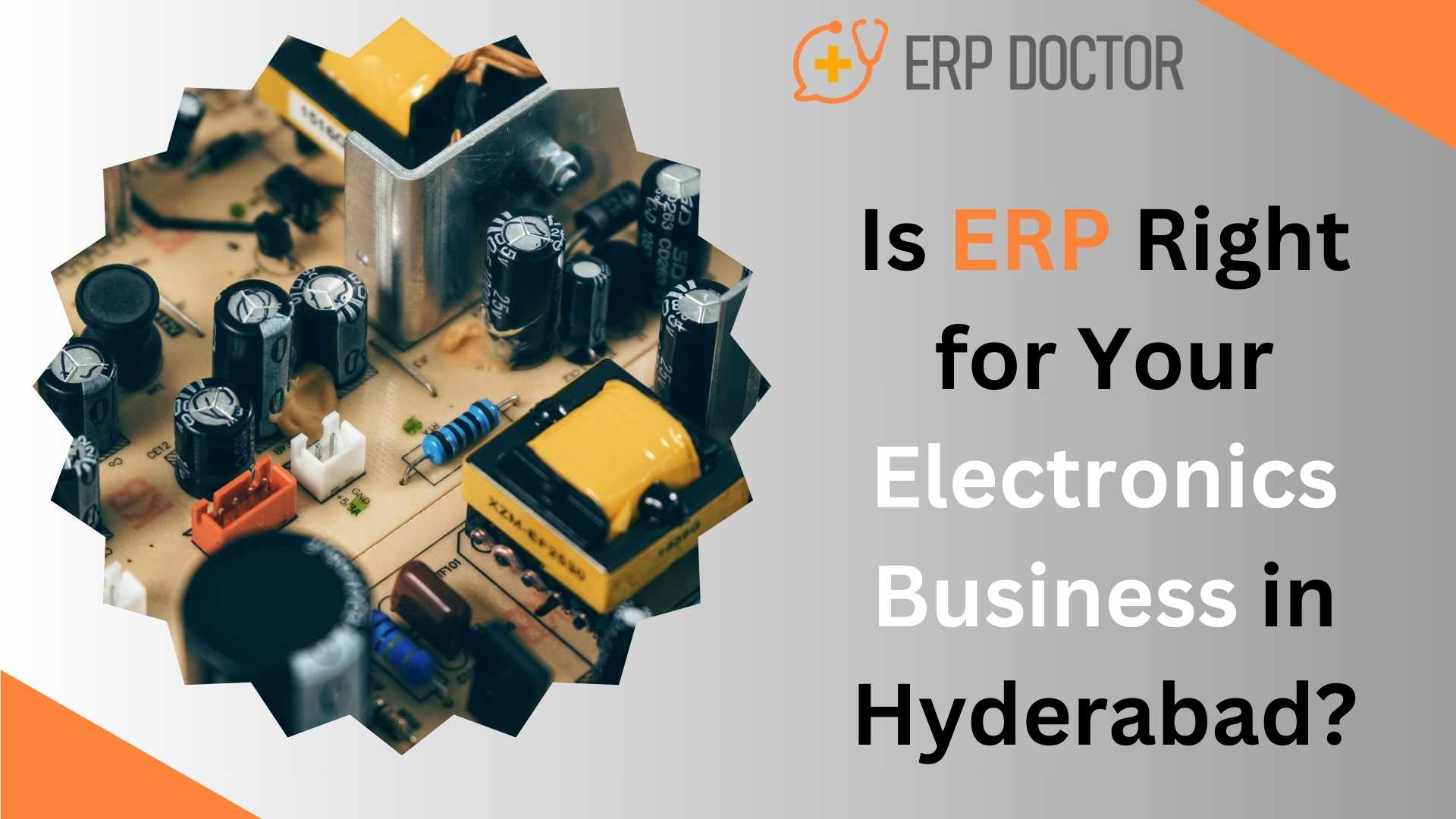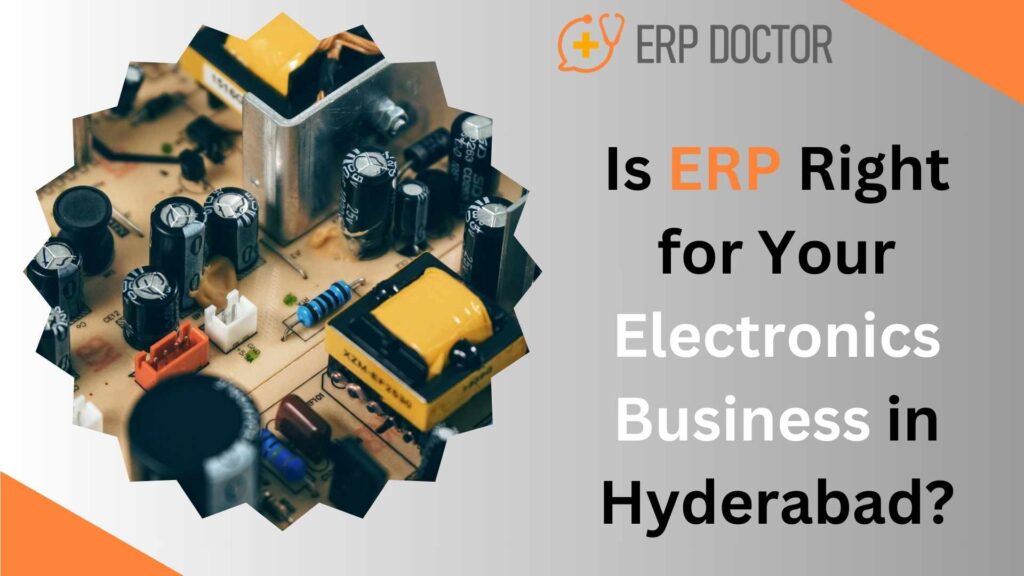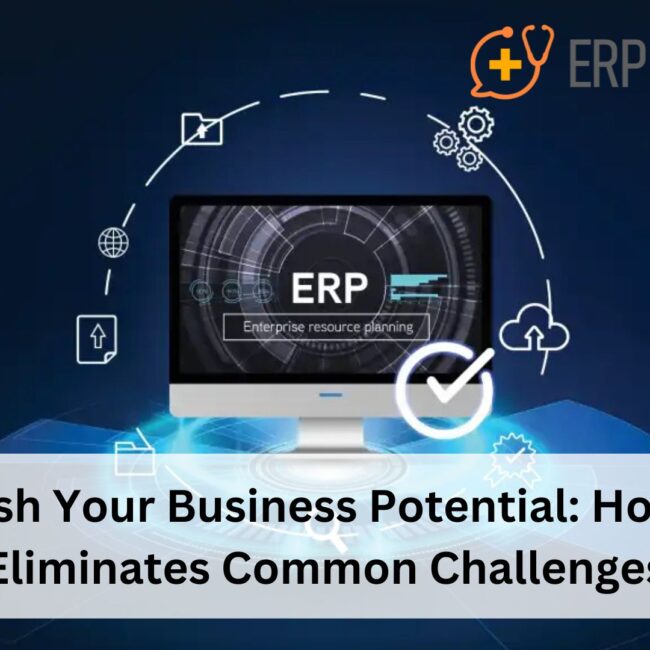
Is ERP Right for Your Electronics Business in Hyderabad?

ERP for Electronics Businesses in Hyderabad: A Strategic Guide
Hyderabad, a burgeoning hub for electronics manufacturing, is witnessing rapid growth and increasing competition. In this dynamic landscape, electronics businesses are constantly seeking ways to optimize operations, improve efficiency, and gain a competitive edge. Enterprise Resource Planning (ERP) systems have emerged as a powerful tool for achieving these goals. But the question remains: Is ERP right for your electronics business in Hyderabad?
This blog post will delve into the intricacies of ERP systems, exploring their benefits, challenges, and suitability for electronics businesses in Hyderabad. We’ll examine the specific needs of the industry and help you determine if an ERP implementation is the right strategic move for your company.
Understanding ERP Systems
At its core, an ERP system is a comprehensive software solution that integrates various business processes, including:
- Manufacturing: Production planning, material requirements planning (MRP), shop floor control, quality management.
- Supply Chain Management: Procurement, inventory management, warehouse management, logistics.
- Finance: Accounting, accounts payable/receivable, general ledger, financial reporting.
- Sales & Marketing: Customer relationship management (CRM), order management, sales analysis.
- Human Resources: Payroll, employee management, talent acquisition.
By centralizing data and automating workflows, ERP systems provide a unified view of the business, enabling better decision-making, improved efficiency, and reduced costs.
Why Consider ERP for Your Electronics Business in Hyderabad?
The electronics industry in Hyderabad faces unique challenges, including:
- Complex Supply Chains: Managing a global network of suppliers, fluctuating component prices, and lead time variability.
- Rapid Technological Advancements: Keeping up with evolving technologies, managing product lifecycles, and adapting to changing customer demands.
- Stringent Quality Requirements: Meeting strict industry standards, ensuring product quality, and managing recalls.
- Intense Competition: Maintaining profitability in a competitive market, optimizing pricing strategies, and differentiating products.
ERP systems can address these challenges by:
- Streamlining Supply Chain Management: ERP enables real-time visibility into inventory levels, supplier performance, and order status, allowing businesses to optimize procurement processes, reduce lead times, and minimize stockouts.
- Improving Production Planning: MRP functionalities within ERP help optimize production schedules, manage capacity, and ensure timely delivery of products.
- Enhancing Quality Control: ERP systems can integrate quality checks throughout the manufacturing process, track defects, and manage corrective actions, improving product quality and reducing scrap.
- Boosting Collaboration: ERP facilitates seamless communication and data sharing between different departments, improving collaboration and efficiency.
- Providing Real-Time Insights: ERP dashboards provide real-time visibility into key performance indicators (KPIs), enabling businesses to make data-driven decisions and respond quickly to changing market conditions.
- Scaling for Growth: As your business grows, ERP systems can scale to accommodate increasing data volumes and transaction loads, ensuring continued efficiency and performance.
Is ERP Right for Your Business?
While ERP offers significant benefits, it’s crucial to assess whether it’s the right fit for your specific needs. Consider the following factors:
- Business Size and Complexity: Smaller businesses with simpler processes may find that a full-fledged ERP system is overkill. Cloud-based or modular ERP solutions might be more suitable.
- Budget: ERP implementations can be expensive. Evaluate the total cost of ownership (TCO), including software licenses, implementation fees, training, and ongoing maintenance.
- Current Systems: Assess your existing systems and identify any gaps or inefficiencies. Determine if an ERP system can effectively address these issues.
- Company Culture: ERP implementations require significant changes to business processes and workflows. Ensure that your employees are willing to adapt to the new system.
Implementing ERP in Hyderabad Electronics Industry
If you decide to implement an ERP system, careful planning and execution are essential for success. Consider these key steps:
- Define Clear Objectives: Identify the specific goals you want to achieve with the ERP implementation.
- Choose the Right ERP Solution: Select an ERP system that is tailored to the needs of the electronics industry and offers the functionalities you require.
- Engage a Qualified Implementation Partner: Partner with an experienced ERP implementation consultant who understands the nuances of the electronics industry.
- Develop a Comprehensive Implementation Plan: Outline the project scope, timeline, budget, and resources.
- Provide Adequate Training: Ensure that your employees receive thorough training on the new system.
- Manage Change Effectively: Communicate the benefits of the ERP implementation to your employees and address any concerns.
The Future of ERP in the Electronics Industry
The future of ERP in the electronics industry is marked by advancements in cloud computing, artificial intelligence (AI), and machine learning. These technologies are enabling:
- Cloud-Based ERP: Offering greater flexibility, scalability, and cost-effectiveness.
- AI-Powered ERP: Automating tasks, providing predictive analytics, and improving decision-making.
- Integration with IoT: Connecting ERP systems with Internet of Things (IoT) devices to gather real-time data from the shop floor and supply chain.
In Conclusion: ERP for a Competitive Edge
ERP systems offer a powerful solution for electronics businesses in Hyderabad to streamline operations, improve efficiency, and gain a competitive edge. However, it’s crucial to carefully assess your needs, evaluate different ERP solutions, and plan the implementation process thoroughly. By making informed decisions and embracing the latest advancements in ERP technology, electronics businesses in Hyderabad can unlock their full potential and thrive in the dynamic global market.
Frequently Asked Questions (FAQs)
What is the typical ROI of an ERP implementation in the electronics business?
ROI varies based on the specific business and implementation. However, common benefits include reduced inventory costs, improved production efficiency, and increased sales.
How long does it typically take to implement an ERP system?
Implementation timelines vary depending on the complexity of the project, but typically range from several months to a year or more.
What are the key considerations when choosing an ERP vendor for an electronics business?
Look for vendors with experience in the electronics industry, strong references, and a proven track record of successful implementations. Consider their support and training offerings as well.
What is the role of cloud computing in ERP for electronics businesses?
Cloud-based ERP offers greater flexibility, scalability, and cost-effectiveness, making it an attractive option for many electronics businesses.
How can ERP help electronics companies manage product lifecycles?
ERP systems can track product versions, manage engineering changes, and facilitate the introduction of new products, streamlining product lifecycle management.
How can ERP improve supply chain visibility for electronics manufacturers?
ERP provides real-time visibility into inventory levels, supplier performance, and order status, enabling businesses to optimize procurement processes and reduce lead times.
What are the challenges of implementing ERP in a global electronics supply chain?
Managing different currencies, languages, regulations, and time zones can be challenging. Choose an ERP system that supports global operations.
How can ERP help electronics companies comply with industry regulations?
ERP systems can track compliance requirements, generate reports, and ensure adherence to industry standards.
What is the importance of data migration in an ERP implementation?
Accurate data migration is crucial for the success of an ERP implementation. Ensure that your data is cleansed and validated before migrating it to the new system.
How can electronics companies leverage AI and machine learning in their ERP systems?
AI and machine learning can automate tasks, provide predictive analytics, and improve decision-making in areas such as demand forecasting, inventory optimization, and quality control.
What is the cost of training employees on a new ERP system?
Training costs vary depending on the complexity of the system and the number of employees. Factor training costs into your overall ERP budget.
How can I ensure user adoption of the new ERP system?
Communicate the benefits of the ERP implementation to your employees, provide adequate training, and address any concerns.
What is the role of change management in ERP implementations?
Change management is crucial for ensuring a smooth transition to the new ERP system. It involves communicating the changes to employees, addressing resistance, and providing support.
How can I measure the success of an ERP implementation?
Track key performance indicators (KPIs) such as inventory turnover, order fulfillment rates, and production efficiency to measure the success of your ERP implementation.
What are some common pitfalls to avoid during an ERP implementation?
Common pitfalls include inadequate planning, insufficient training, poor communication, and underestimating the complexity of the project.
Would you be ready to explore the power of ERP Solutions? Let’s start the conversation!
Warning: Trying to access array offset on value of type null in /home/u231991539/domains/erpdoctor.in/public_html/wp-content/plugins/wpforms/includes/class-frontend.php on line 109







